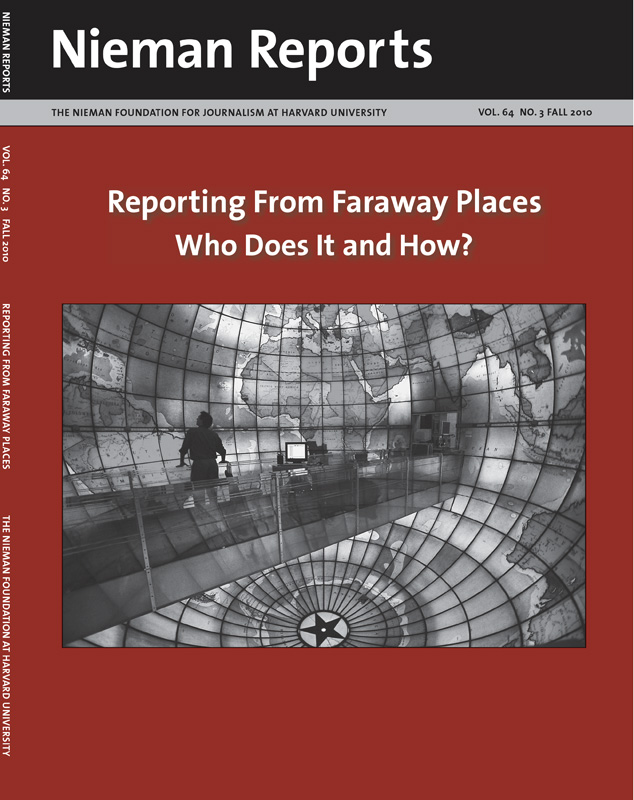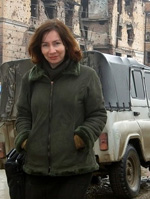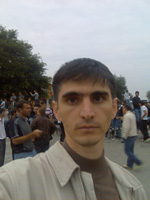Fatima Tlisova is an independent journalist living in exile after enduring years of intimidation and threats, harassment and arrest by government officials in the North Caucasus region of Russia. Earlier this year she returned to the region and traveled in Europe to talk with journalists about what caused them to flee their country. For her colleagues who were murdered in the course of their reporting, she reminds us of the stories they were working on—the ones that likely led to their deaths. This project was supported by the Pulitzer Center on Crisis Reporting in partnership with Nieman Reports.
Tlisova’s expanded profiles of her colleagues are online at the Pulitzer Center on Crisis Reporting.
Yuri Bagrov reported for The Associated Press in the North Caucasus, where he covered the war in Chechnya and the terrorist attacks that were spreading across the region. He investigated corruption in local government and war crimes. He was constantly harassed for his professional activities. He was arrested, searched and had his passport confiscated by the security services, which restricted his ability to travel across the region. His laptop computer, with data for all of his stories, was stolen. Family members received phone calls promising severe punishment and death. In 2007, he was granted political asylum in the United States.
Valery Dzutsev worked as the North Caucasus coordinator for the Institute for War and Peace Reporting (IWPR), a UK-based nongovernmental organization. In 2004 he reported from the Beslan School #1 on the hostage crisis where more than 300 people died during a rescue operation. In 2007 Dzutsev was accused of tax evasion; the case was never dismissed although the investigation showed that he had paid the taxes. His computers were confiscated and he was warned that the government intended to imprison him for his work with IWPR. In 2008 Dzutsev was granted political asylum in the U.S. The IWPR subsequently closed its North Caucasus office.
Natalia Estemirova was an award-winning journalist and human rights activist based in Chechnya. For more than a decade she reported for human rights organizations and Novaya Gazeta, an independent newspaper that had lost four of its journalists covering the Caucasus. She investigated activities of the “Eskadrony smerti” or death squads. For more than a decade she collected and published video and photographic evidence of the state security services’ involvement in the disappearance and murder of local residents. In July 2009, she was abducted near her apartment in Chechnya. That same day her body was found with bullets in her head and chest. Russia denied the United Nations access to investigate Estemirova’s assassination.
Magomed Evloyev was a founder of the Web site Ingushetia.ru, which became the most popular news source in the North Caucasus. Through its use of social media, Evloyev’s site provided exclusive video and photographs of terrorist attacks and public protests as well as investigative reports about corruption in local government. After he organized a public campaign showing that more than 70 percent of the votes in Ingushetia were fraudulent, the Kremlin organized a court hearing against Ingushetia.ru in which it accused Evloyev of extremism. In 2008, Evloyev was abducted and killed while in police custody. The officer who was found to be responsible was released from jail this year and promoted; he was killed in August.
Elena Maglevannaya was a freelance reporter for a local newspaper in Russia’s southern city of Volgograd. The city administration issued a libel suit against her for investigative reports about the torture of detainees in local prisons. The court ignored evidence she presented and sentenced her to publish a refutation and pay a $7,000 fine—an amount of money she had never had in her life. She was attacked by the members of the Russian neo-Nazi group RNU who promised her an easy solution—institutionalization. In May 2009 Maglevannaya fled Russia seeking political asylum in Finland.
Zurab Markhiev reported from Ingushetia—the most violent region in the North Caucasus—for more than six years. He investigated crimes committed by the Russian military and security troops, reported from the scene of a terror attack, and wrote about torture, extrajudicial killings, and the daily disappearance of local people. In 2006 he was abducted by the Federal Security Service (FSB), the KGB’s successor, and forced to sign an agreement of collaboration under the threat of death. Two years later, he received a warning that he was targeted for assassination by the FSB. In 2009, Markhiev fled Russia, seeking political asylum in Europe.
Oleg Panfilov is an internationally recognized author and expert on media and journalism in crisis zones. He is a founder and chairman of the Center for Journalism in Extreme Situations, a journalist protection organization in Moscow. Long denied access to the Russian mainstream media, Panfilov in the fall of 2009 bought a one-way ticket from Moscow to Tbilisi, Georgia. What happened to Panfilov represents the strategies of marginalization and alienation—the two methods that the Kremlin uses most often to bring about censorship in Russia.
Mikael Storsjö is a prominent Swedish journalist who focuses on Internet freedom. He provides hosting for Kavkaz Center, the most controversial Web site now covering the North Caucasus. Chechen IT specialist and journalist Adam Tumsoev [a pseudonym used to protect his identity] administers Kavkaz Center. This Web site is blocked in Russia as being a platform for local leaders of a jihadist underground. However, in the absence of an independent news media, which the Russian government’s aggressive tactics have effectively smothered, Kavkaz Center remains the only and most popular source of resistance information for international journalists. They quote from this Web site when reporting on the situation in the North Caucasus.
Tlisova’s expanded profiles of her colleagues are online at the Pulitzer Center on Crisis Reporting.
Yuri Bagrov reported for The Associated Press in the North Caucasus, where he covered the war in Chechnya and the terrorist attacks that were spreading across the region. He investigated corruption in local government and war crimes. He was constantly harassed for his professional activities. He was arrested, searched and had his passport confiscated by the security services, which restricted his ability to travel across the region. His laptop computer, with data for all of his stories, was stolen. Family members received phone calls promising severe punishment and death. In 2007, he was granted political asylum in the United States.
Valery Dzutsev worked as the North Caucasus coordinator for the Institute for War and Peace Reporting (IWPR), a UK-based nongovernmental organization. In 2004 he reported from the Beslan School #1 on the hostage crisis where more than 300 people died during a rescue operation. In 2007 Dzutsev was accused of tax evasion; the case was never dismissed although the investigation showed that he had paid the taxes. His computers were confiscated and he was warned that the government intended to imprison him for his work with IWPR. In 2008 Dzutsev was granted political asylum in the U.S. The IWPR subsequently closed its North Caucasus office.
Natalia Estemirova was an award-winning journalist and human rights activist based in Chechnya. For more than a decade she reported for human rights organizations and Novaya Gazeta, an independent newspaper that had lost four of its journalists covering the Caucasus. She investigated activities of the “Eskadrony smerti” or death squads. For more than a decade she collected and published video and photographic evidence of the state security services’ involvement in the disappearance and murder of local residents. In July 2009, she was abducted near her apartment in Chechnya. That same day her body was found with bullets in her head and chest. Russia denied the United Nations access to investigate Estemirova’s assassination.
Magomed Evloyev was a founder of the Web site Ingushetia.ru, which became the most popular news source in the North Caucasus. Through its use of social media, Evloyev’s site provided exclusive video and photographs of terrorist attacks and public protests as well as investigative reports about corruption in local government. After he organized a public campaign showing that more than 70 percent of the votes in Ingushetia were fraudulent, the Kremlin organized a court hearing against Ingushetia.ru in which it accused Evloyev of extremism. In 2008, Evloyev was abducted and killed while in police custody. The officer who was found to be responsible was released from jail this year and promoted; he was killed in August.
Elena Maglevannaya was a freelance reporter for a local newspaper in Russia’s southern city of Volgograd. The city administration issued a libel suit against her for investigative reports about the torture of detainees in local prisons. The court ignored evidence she presented and sentenced her to publish a refutation and pay a $7,000 fine—an amount of money she had never had in her life. She was attacked by the members of the Russian neo-Nazi group RNU who promised her an easy solution—institutionalization. In May 2009 Maglevannaya fled Russia seeking political asylum in Finland.
Zurab Markhiev reported from Ingushetia—the most violent region in the North Caucasus—for more than six years. He investigated crimes committed by the Russian military and security troops, reported from the scene of a terror attack, and wrote about torture, extrajudicial killings, and the daily disappearance of local people. In 2006 he was abducted by the Federal Security Service (FSB), the KGB’s successor, and forced to sign an agreement of collaboration under the threat of death. Two years later, he received a warning that he was targeted for assassination by the FSB. In 2009, Markhiev fled Russia, seeking political asylum in Europe.
Oleg Panfilov is an internationally recognized author and expert on media and journalism in crisis zones. He is a founder and chairman of the Center for Journalism in Extreme Situations, a journalist protection organization in Moscow. Long denied access to the Russian mainstream media, Panfilov in the fall of 2009 bought a one-way ticket from Moscow to Tbilisi, Georgia. What happened to Panfilov represents the strategies of marginalization and alienation—the two methods that the Kremlin uses most often to bring about censorship in Russia.
Mikael Storsjö is a prominent Swedish journalist who focuses on Internet freedom. He provides hosting for Kavkaz Center, the most controversial Web site now covering the North Caucasus. Chechen IT specialist and journalist Adam Tumsoev [a pseudonym used to protect his identity] administers Kavkaz Center. This Web site is blocked in Russia as being a platform for local leaders of a jihadist underground. However, in the absence of an independent news media, which the Russian government’s aggressive tactics have effectively smothered, Kavkaz Center remains the only and most popular source of resistance information for international journalists. They quote from this Web site when reporting on the situation in the North Caucasus.











